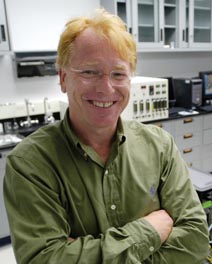James S. Bonner, Ph.D., P.E.
Chief Research and Education Officer

James S. Bonner, Ph.D., P.E.
James S. Bonner, Ph.D., P.E., Chief Research and Education Officer, holds a dual appointment as a professor of civil and environmental engineering and Shipley Fellow at Clarkson University.
A nationally recognized expert in real-time water monitoring technologies, Bonner leads the development and implementation of the River and Estuary Observatory Network (REON) to create a first-of-its-kind real-time monitoring network for rivers and estuaries. REON is a joint effort between Beacon Institute, Clarkson University and IBM.
REON allows for continuous monitoring of physical, chemical and biological data from points in New York's Hudson, Mohawk and St. Lawrence Rivers via an integrated network of sensors, robotics, mobile monitoring and computational technology deployed in the rivers.
“Tremendous human impact occurs in the regions where rivers and estuaries meet the ‘coastal margin’ – coastal wetlands, bays and shoreline,” explained Bonner. “In the United States, this region is home to 70% of the population and 20 of its 25 largest cities. It is also where most industry and ports are found.”
Bonner is also responsible for Beacon Institute oversight of SENSE IT, an educational collaboration with Clarkson University funded in large part by the National Science Foundation. SENSE IT brings sensor technology into the high-school classroom by providing teachers with the hands-on curriculum modules and equipment to teach their students to construct their own prototype water quality sensors, with the ultimate goal of interesting students in science, engineering and technology career paths.
Bonner holds an M.S. in civil engineering and a Ph.D. in civil and environmental engineering from Clarkson University, as well as a B.A. in biology from SUNY Plattsburgh. In the early 1990s, he spearheaded an effort with colleagues from Texas A&M University to pursue a long-term research project to improve understanding of modern oil spill remediation and countermeasure technologies.
Bonner also established the Shoreline Environmental Research Facility in Corpus Christi, TX, where he developed and implemented technologies that use high-frequency radar to map surface water along the Texas coastline. He has developed new technologies that provide real-time continuous monitoring with in-situ sensing ("sensing in place") to measure important water parameters. With funding from the National Science Foundation, he has undertaken a national effort to create a cyber-collaboratory framework, enabling collection and circulation of real-time data and data analysis in the study of oxygen depletion in water.



